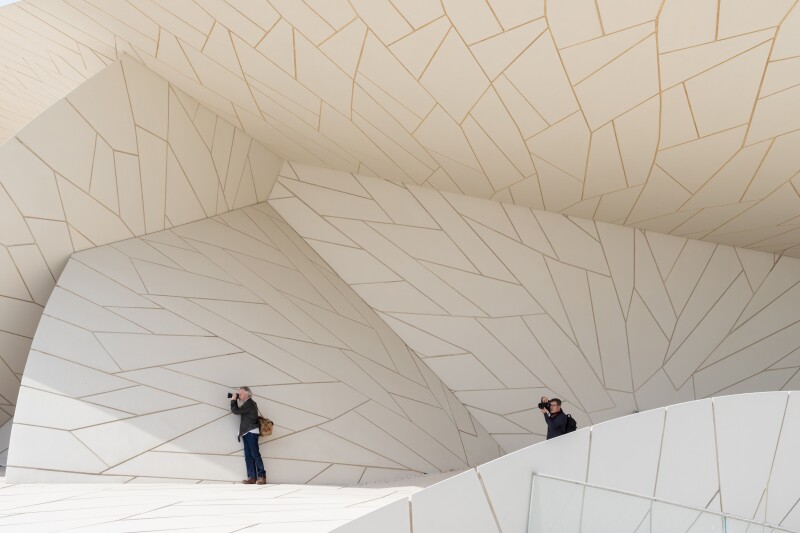The new National Museum of Qatar opened Thursday, near the Doha Corniche, after several years of construction. Under the patronage of His Highness Sheikh Tamim bin Hamad bin Khalifa Al Thani, the museum showcases Qatar’s cultural heritage through commissioned film and art, as well as artifacts and oral histories gathered over the years.
Designed by Jean Nouvel, the French architect behind the Louvre Abu Dhabi, the National Museum of Qatar is made of large interlocking discs built to look like the desert rose, a crystalline phenomenon that occurs in deserts when sand, water, and either gypsum or baryte fuse into a rose-like formation. The entire new structure was built surrounding the museum’s former home in the restored historic Palace of Sheikh Abdullah bin Jassim Al Thani, the son of Qatar’s modern founder.

The restored historic palace of Sheikh Abdullah bin Jassim Al Thani is at the center of the new National Museum of Qatar.
Photo by Iwan Baan
Using research from archaeologists and historians at Qatar University as well as international institutions like the Natural History Museum in London and the Moesgaard Museum in Denmark, the National Museum of Qatar decided to divide its 11 permanent galleries into three phases (Beginnings, Life in Qatar, and The Modern History of Qatar).

The new museum is inspired by the desert rose, a phenomenon that happens in deserts around the world.
Photo by Shutterstock

The building’s sloping interior walls mean that artifacts and art cannot be hung vertically.
Photo by Iwan Baan
Visitors will walk along 1.5 km (0.9 miles) of gallery space, organized to take them chronologically throughout the country’s history from the formation of the Qatar peninsula millennia ago to more recent events including the ongoing economic blockade against Qatar that started in 2017 when Saudi Arabia, Egypt, the United Arab Emirates, and Bahrain cut economic and political ties with the country.
What to look for inside
Because the interiors of the galleries are sloped—making it hard to hang anything on the walls—projected films and dioramas feature heavily throughout the space.
In one gallery, you can watch the nine-minute short film Life in Al Barr (the Desert) by Abderrahmane Sissako, a Mauritanian writer-director. Sissako spent a week back in March 2017 filming members of the Bedouin Al Naemi family in Rawda Al Ghadriat, in the Northern Desert of Qatar, to share what daily life is like for nomadic families. To create a more immersive experience, many of these films are displayed along dioramas. Here, you’ll get to see the bait al-sha’r, a type of nomadic tent that belongs to the Al Naemi family.

Jean-Michel Othoniel’s “ALFA” fountains decorate the lagoon at the new National Museum of Qatar.
Photo by Martin Argyroglo
More of the museum’s sculptural work is featured outside the building. You’ll find On Their Way—a group of four camels that also represent Qatar’s nomadic history—by the French artist Roch Vandromme in the central courtyard. The largest installation by Jean-Michel Othoniel—another French artist—features in the nearly 3,000-foot-long lagoon set in the park surrounding the museum. Activated once an hour, ALFA is made up of 114 stand-alone black fountains that recall Arabic calligraphy or the reeds that calligraphers use to make pens.

A close-up view of the National Museum of Qatar’s interlocking discs designed by Ateliers Jean Nouvel
Photo by Iwan Baan
How to visit
Adult admission for The National Museum of Qatar is QAR 50 (about US$14). Residents of Qatar and all children age 16 and under visit free. During its opening weekend, the museum’s hours are 10 a.m. to 9 p.m. on Thursday, March 28, 1:30 p.m. to 7 p.m. on Friday, March 29, and 10 a.m. to 7 p.m. on Saturday, March 30. Official hours will be announced at a later date.

There is nearly one mile of gallery space inside the new museum.
Photo by Iwan Baan
Why go now
If you’re planning on making the trip in 2022 to the FIFA World Cup in Qatar, you should definitely plan on stopping by to check out the galleries. Along with the I.M. Pei–designed Museum of Islamic Art that opened in 2008, the National Museum of Qatar establishes Doha as a cultural destination within the Gulf region. The Orientalist Museum, designed by Herzog & de Meuron, and the waterfront Art Mill exhibition space are also slated to open before the 2022 World Cup, according to The Art Newspaper.
Qatar Airways has fairly generous layover policies for anyone stopping through Doha on their travels. Citizens from 80 countries (including the United States) qualify for visa-free entry into Qatar. For layovers between five and 12 hours, travelers can pay QAR 75 (about US$21) for a bus tour that drives past both museums and makes stops at the Souq Waqif and the Katara Cultural Village. However, if you wish to have time to go into either museum, you can opt to add a layover of up to four nights with rates as low as QAR 84 (about US$23) at four-star hotels when you book through Qatar Airways.
>> Next: Plan Your Trip With AFAR’s Guide to Doha











